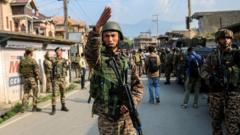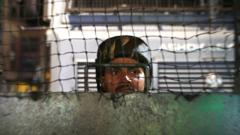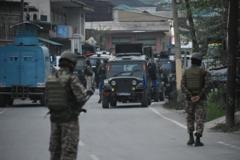Following a tragic militant attack in Indian-administered Kashmir, India has initiated military operations against targets in Pakistan, claiming responsibility for the violence lies with militant infrastructure. Pakistani officials deny any involvement and assert that the strikes were unprovoked, contributing to an already volatile situation between the two nations.
Rising Tensions: India Strikes Amid Kashmir Unrest

Rising Tensions: India Strikes Amid Kashmir Unrest
India conducts military strikes in Pakistan and Pakistan-administered Kashmir after a deadly attack on tourists, escalating tensions between the nuclear powers.
In a significant escalation of hostilities, India has executed military strikes on various sites located in both Pakistan and Pakistan-administered Kashmir. This operation, termed "Operation Sindoor," was launched in response to a terrorist attack that occurred on April 22, which tragically resulted in the deaths of 25 Indians and one Nepali citizen in the picturesque region of Pahalgam.
India’s Defence Ministry has emphasized that these strikes serve as a commitment to holding accountable those responsible for the deadly attacks, while Pakistan’s Prime Minister, Shehbaz Sharif, has condemned the actions as "unprovoked" aggression and vowed that such "heinous acts" would not go unpunished.
Reports from both sides provide conflicting figures regarding casualties. Pakistan claims to have shot down five Indian aircraft along with a drone, while the Indian military states that 10 civilians were killed due to Pakistani shelling. The strikes reportedly targeted what India describes as "terrorist infrastructure," steering clear of Pakistani military facilities, as stated by the Indian army.
India’s actions were fueled by the sentiments following the April attack, which was described as the most severe assault on civilians in the region in the last twenty years. Survivors alleged that the attackers were deliberately targeting Hindu individuals, inciting widespread outrage across India. Prime Minister Narendra Modi has expressed his intention to pursue the attackers relentlessly, although no specific militant group has been named in connection with the incident.
Tensions have been mounting over the Kashmir conflict for decades, a bitter point of contention between India and Pakistan since their partition in 1947. The region has seen extensive violence, with a history of insurgency, and both nations have fought multiple wars over territorial claims. The current tensions have been exacerbated by India's revocation of Kashmir's semi-autonomous status in 2019, which has since seen fluctuating levels of militancy and a surge in tourism following a temporary decline in violence.
Previous incidents, such as the 2016 Uri attack and the 2019 Pulwama bombing, led to military engagements that have historically threatened to engulf both nations in deeper conflict. In response to the latest developments, international leaders, including UN Secretary-General Antonio Guterres, have urged both nations to exercise maximum restraint as they navigate this perilous situation.





















